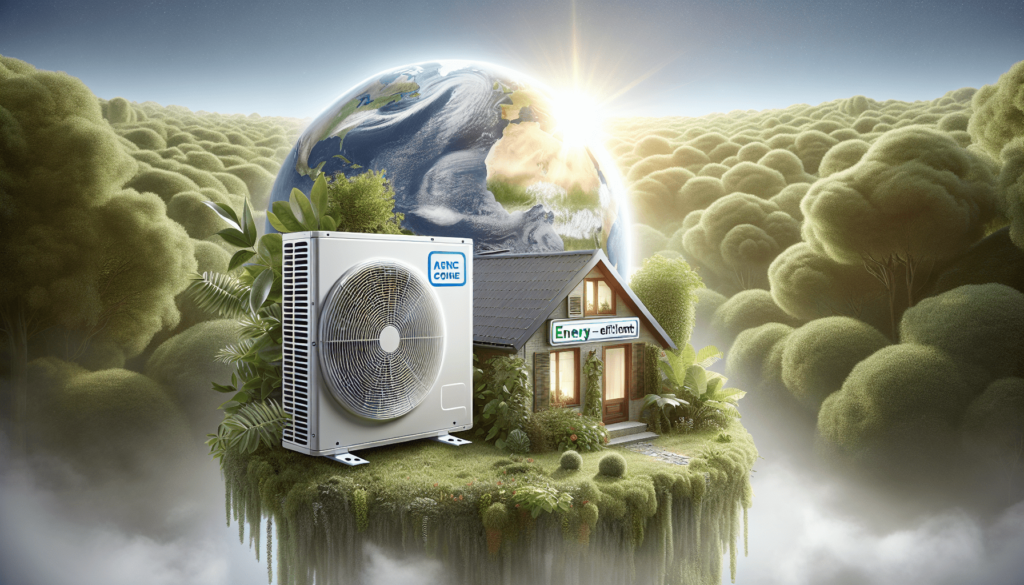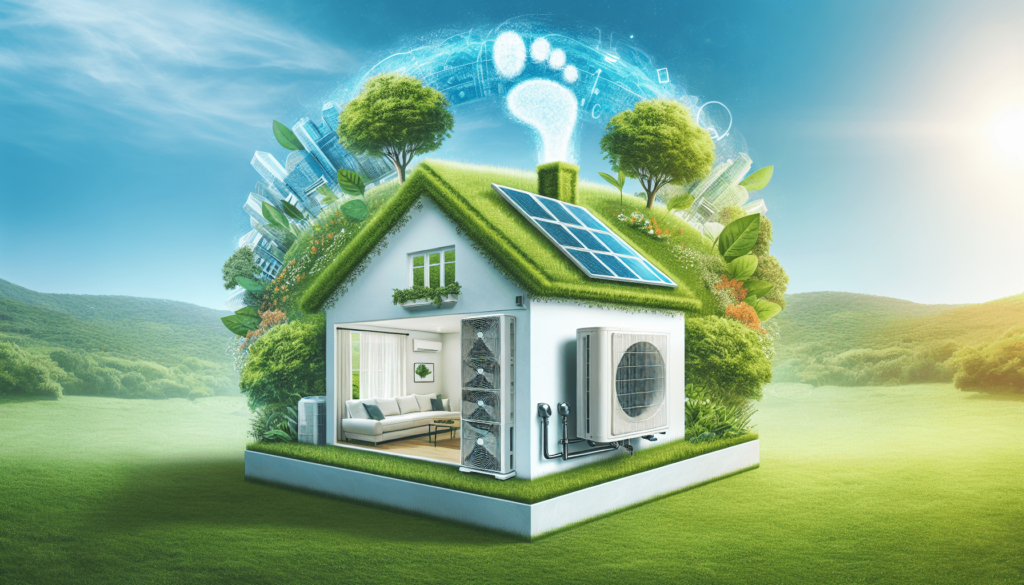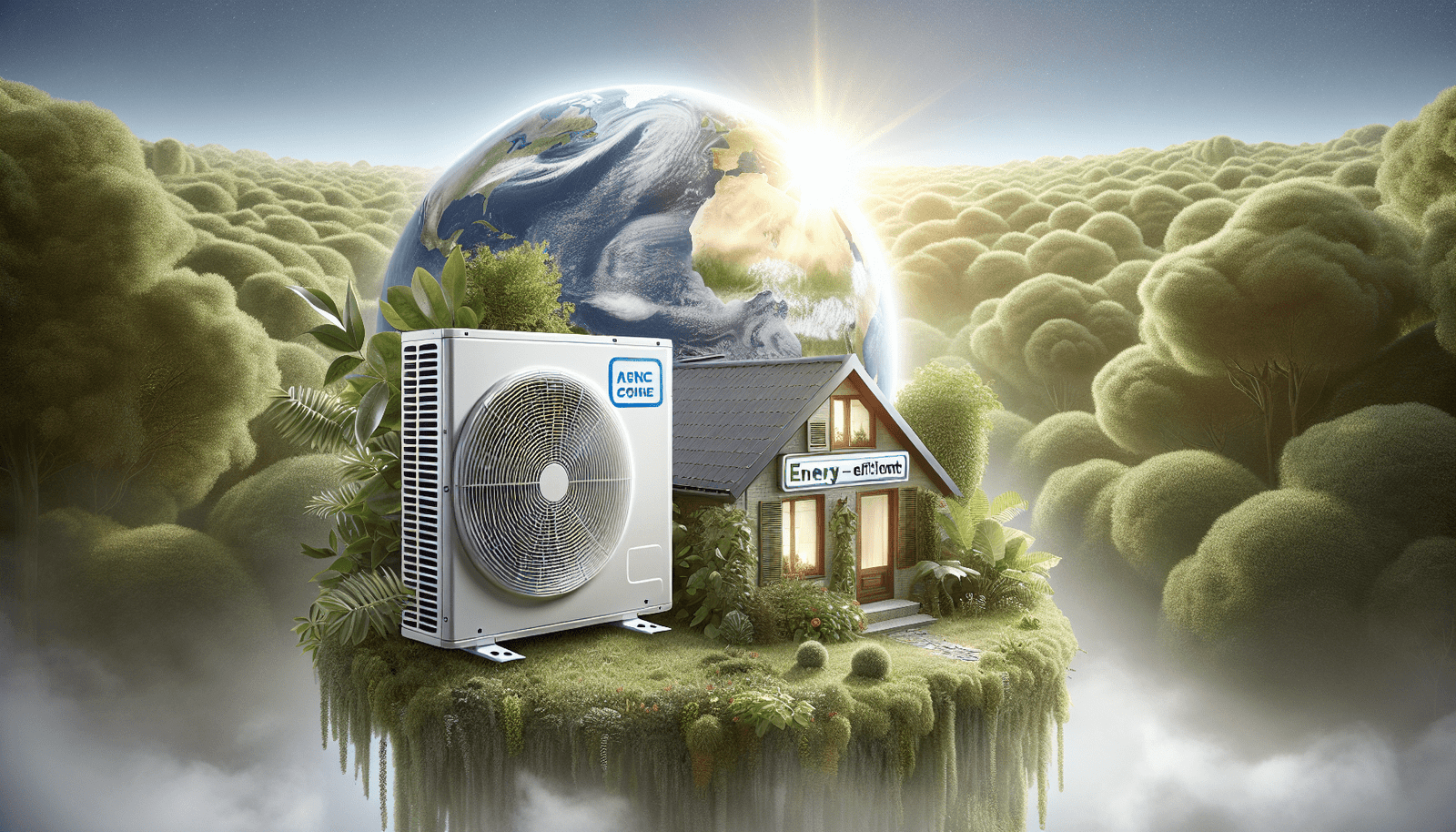Are you concerned about the environmental impact of your heating and cooling choices? Look no further than mini split heat pumps. These innovative devices offer an energy-efficient and eco-friendly alternative to traditional HVAC systems. By harnessing the power of electricity rather than burning fossil fuels, mini split heat pumps significantly reduce carbon emissions, leading to a greener and cleaner environment for all. Whether you’re looking to heat or cool your home, these versatile systems are not only cost-effective but also contribute to a more sustainable future. Discover the many benefits of using mini split heat pumps and make a positive impact on our planet today.

Definition of Mini Split Heat Pumps
Mini split heat pumps are heating and cooling systems that provide efficient and effective climate control for homes and buildings. They consist of two main components: an outdoor unit and an indoor unit. These units are connected by refrigerant lines and do not require ductwork for installation. Mini split heat pumps work by transferring heat between the indoor and outdoor units, using refrigerant to absorb and release heat. They are designed to provide both heating and cooling capabilities, making them a versatile and energy-efficient choice for homeowners.
Energy Efficiency of Mini Split Heat Pumps
Comparison with traditional heating and cooling systems
When compared to traditional heating and cooling systems, mini split heat pumps offer significant energy efficiency benefits. Traditional systems, such as furnaces and air conditioners, often rely on combustion processes or electric resistance heating, which can be inefficient. In contrast, mini split heat pumps utilize the principles of heat transfer, which are more efficient and require less energy consumption.
SEER and HSPF ratings
The energy efficiency of mini split heat pumps is measured by two ratings: Seasonal Energy Efficiency Ratio (SEER) and Heating Seasonal Performance Factor (HSPF). SEER measures the cooling efficiency of the system, while HSPF measures the heating efficiency. The higher the SEER and HSPF ratings, the more energy-efficient the system is. Mini split heat pumps typically have higher SEER and HSPF ratings compared to traditional systems, resulting in reduced energy consumption and lower utility bills.
Reduced energy consumption
One of the significant environmental benefits of mini split heat pumps is their reduced energy consumption. By using heat transfer instead of combustion processes or electric resistance heating, these systems can achieve higher levels of energy efficiency. This translates into lower electricity usage and diminished strain on the electrical grid. With each household contributing to reduced energy consumption, the overall environmental impact is significant, leading to a more sustainable future.
Reduced Greenhouse Gas Emissions
Using less electricity
Since mini split heat pumps are highly energy efficient, they help to reduce greenhouse gas emissions. By using less electricity compared to traditional heating and cooling systems, they lower the demand for power generation, which often relies on fossil fuels. This reduction in electricity usage contributes to the mitigation of greenhouse gas emissions, helping to combat climate change and minimize the environmental impact of energy consumption.
Reducing reliance on fossil fuels
Mini split heat pumps provide an opportunity to reduce reliance on fossil fuels for heating and cooling. Unlike traditional systems that often rely on heating oil or natural gas, mini split heat pumps can operate solely on electricity. By transitioning to electrically powered mini split heat pumps, homeowners can significantly reduce their carbon footprint and decrease their dependence on fossil fuels, which are finite resources.
Lowering carbon footprint
By reducing energy consumption and minimizing the use of fossil fuels, mini split heat pumps contribute to lowering carbon footprints. These systems offer an environmentally friendly alternative to conventional heating and cooling methods. As more people adopt mini split heat pumps, the collective impact on carbon emissions can be substantial, resulting in a healthier and more sustainable environment for future generations.
Decreased Air Pollution
No combustion process
Unlike traditional heating systems that rely on combustion processes, mini split heat pumps do not burn fossil fuels or produce emissions. This absence of a combustion process greatly reduces air pollution and eliminates the release of harmful gases, such as carbon monoxide and nitrogen dioxide. By opting for mini split heat pumps, you can contribute to cleaner air quality and improve the overall health and well-being of your community.
No emissions of harmful gases
Traditional heating systems that rely on fuels like natural gas or heating oil release harmful gases into the atmosphere during combustion. These gases contribute to air pollution, smog, and respiratory problems. In contrast, mini split heat pumps do not emit any harmful gases, making them an environmentally friendly choice. By choosing a mini split heat pump, you can help protect the air quality and create a healthier living environment for you and your loved ones.
Reduced indoor pollution
Traditional heating systems can sometimes introduce pollutants into the indoor environment, such as carbon monoxide and volatile organic compounds (VOCs). These pollutants can have adverse effects on indoor air quality and human health. Since mini split heat pumps do not rely on combustion, they eliminate the risk of indoor air pollution associated with traditional heating systems. Improved indoor air quality is beneficial for allergy sufferers and individuals with respiratory conditions, providing a healthier and more comfortable living space.

Ozone Layer Protection
Eliminating the use of ozone-depleting refrigerants
Mini split heat pumps use refrigerants that have a minimal impact on the ozone layer. Unlike older systems that use ozone-depleting refrigerants like chlorofluorocarbons (CFCs) or hydrochlorofluorocarbons (HCFCs), modern mini split heat pumps utilize more environmentally friendly refrigerants such as R-410A. These refrigerants do not contribute to ozone depletion, ensuring the protection of the earth’s ozone layer, which is crucial for shielding us from harmful ultraviolet radiation.
Reduction in Noise Pollution
Quiet operation of mini split heat pumps
Mini split heat pumps are known for their quiet operation, contributing to a peaceful and noise-free indoor environment. Compared to traditional HVAC systems, which can produce loud noises, mini split heat pumps operate quietly due to their split design and the use of variable speed compressors. Their low noise levels make them ideal for bedrooms, living rooms, and other areas where noise pollution can be disruptive. By switching to mini split heat pumps, you can enjoy the benefits of a serene and tranquil living space.
Environmental Benefits of Zoned Heating and Cooling
Precise temperature control
One of the key environmental benefits of mini split heat pumps is their ability to provide precise temperature control. With zoned heating and cooling, you can adjust the temperature levels in individual rooms or zones, avoiding unnecessary heating or cooling of unoccupied spaces. This targeted approach to temperature control reduces energy waste and promotes energy efficiency, resulting in lower energy consumption and cost savings.
Reduced energy waste
Zoned heating and cooling offered by mini split heat pumps significantly reduce energy waste compared to traditional systems. By only heating or cooling occupied spaces, you eliminate the need to condition the entire home or building, reducing energy consumption and lowering utility bills. Additionally, mini split heat pumps allow for customizable scheduling, ensuring that rooms are heated or cooled only when needed. This energy-efficient approach helps to minimize environmental impact and promotes sustainable living.
Improved indoor air quality
Mini split heat pumps contribute to improved indoor air quality, which is essential for a healthy living environment. With zoned heating and cooling, you can prevent the circulation of air pollutants by selectively conditioning specific areas. This targeted approach reduces the spread of allergens, dust, and other contaminants, leading to cleaner and fresher indoor air. By improving indoor air quality, mini split heat pumps contribute to a healthier and more comfortable home environment for you and your family.
Longevity and Sustainability of Mini Split Heat Pumps
Durable components and materials
Mini split heat pumps are designed with durable components and materials, ensuring their longevity and sustainability. By using high-quality materials, these systems are built to withstand the elements and operate reliably for extended periods. This durability reduces the need for frequent replacements, resulting in less waste and a reduced burden on landfills.
Extended lifespan
Compared to traditional heating and cooling systems, mini split heat pumps have a longer lifespan. With regular maintenance and proper usage, mini split heat pumps can last 20 years or more. This extended lifespan minimizes the environmental impact associated with the manufacturing and disposal of new heating and cooling systems, further contributing to sustainability.
Reduced waste
The longevity and durability of mini split heat pumps translate to reduced waste generation. By utilizing a system that lasts for many years without the need for frequent replacements, you contribute to the reduction of electronic waste. Electronic waste poses significant environmental hazards, with components containing potentially harmful substances. By opting for mini split heat pumps, you actively promote waste reduction and support sustainability efforts.
Potential Environmental Drawbacks
Manufacturing and disposal of mini split heat pumps
While mini split heat pumps offer numerous environmental benefits, the manufacturing and disposal processes can have some environmental drawbacks. The production of mini split heat pumps involves the extraction and processing of raw materials, which can contribute to environmental degradation. Additionally, at the end of their lifecycle, proper disposal and recycling of these systems is crucial to prevent potential harm to the environment. Therefore, it is essential to choose reputable manufacturers and ensure responsible disposal and recycling of old units.
Power source dependency
Mini split heat pumps rely on electricity as their power source. The environmental impact of using these systems depends on the source of the electricity. If the electricity is generated from renewable sources like solar or wind, the environmental impact is minimal. However, if the electricity is derived from fossil fuels, such as coal or natural gas, the overall environmental benefits of mini split heat pumps may be diminished. Increasing the use of renewable energy sources is crucial to maximize the environmental advantages of mini split heat pumps.
Energy grid impact
To support the operation of mini split heat pumps, the electrical grid may experience increased demand, especially during peak seasons. The grid’s capacity to handle this increased demand while maintaining efficiency and stability can vary depending on the region. It is important for energy providers to upgrade and modernize the grid infrastructure to accommodate the growing use of energy-efficient systems like mini split heat pumps. A well-maintained and robust energy grid is essential to ensure the optimal environmental impact of these systems.
The Importance of Proper Installation and Maintenance
Efficiency and performance optimization
Proper installation and regular maintenance of mini split heat pumps are crucial for maximizing their energy efficiency and performance. Incorrect installation or neglecting maintenance can lead to various issues, such as reduced efficiency, equipment malfunction, and increased energy consumption. To ensure optimal environmental impact, it is essential to enlist the help of qualified professionals for installation and conduct regular maintenance according to the manufacturer’s guidelines.
Avoiding refrigerant leaks
Refrigerant leaks can have detrimental effects on the environment. Some refrigerants used in mini split heat pumps, while more environmentally friendly compared to ozone-depleting substances, still contribute to global warming potential if released into the atmosphere. Regular inspection and prompt repair of any leaks are essential to minimize the environmental impact and ensure the efficient operation of the system.
Ensuring proper airflow
Proper airflow is crucial for the optimal performance of mini split heat pumps. Blocked or restricted airflow can lead to decreased efficiency, increased energy consumption, and reduced lifespan of the system. Regularly cleaning or replacing air filters, ensuring proper insulation, and keeping the outdoor unit free from debris are simple maintenance tasks that promote proper airflow and contribute to the long-term sustainability of mini split heat pumps.
In conclusion, mini split heat pumps offer numerous environmental benefits, making them a sustainable choice for heating and cooling your home or building. From their energy efficiency and reduced greenhouse gas emissions to the elimination of harmful emissions and protection of the ozone layer, these systems contribute to a healthier planet. With their quiet operation, zoned heating and cooling capabilities, and long lifespan, mini split heat pumps further enhance their positive environmental impact. However, it is important to consider potential environmental drawbacks and address them through proper installation, maintenance, and responsible manufacturing and disposal practices. By utilizing mini split heat pumps and adopting sustainable practices, you can make a positive impact on the environment while enjoying comfortable and efficient climate control in your living space.

